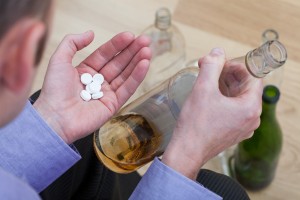 You have seen it before; the warning on the label of a bottle of pills or a box of medication, urging the user to not mix the drug with alcohol. You might not have worried too much about it, because you weren’t’t inclined to be drinking alcohol when suffering a cold, the flu or whatever other malady is leading you to need medication. But what if you take prescription drugs on a regular basis, as is the case with nearly half of the American population, according to a report issued last year by the Centers for Disease Control and Prevention. Many of the most common prescription drugs carry this warning against using alcohol while taking the medication, but it is not the case that half of American adults avoid alcohol. Only 30% of the adult population abstains entirely from drinking, per data from the National Institutes of Health, so clearly there is a large number of people who “break the rules” by violating the prohibition on the bottle label and drinking alcohol despite also using medication. And indeed that is the case. A recent study, also published by the National Institutes of Health (NIH), reports that nearly 42% of American adults who drink admit to also using medications which have been demonstrated to have potentially dangerous interactions with alcohol. This is based on survey data collected from more than 26,000 adults from across the United States.
You have seen it before; the warning on the label of a bottle of pills or a box of medication, urging the user to not mix the drug with alcohol. You might not have worried too much about it, because you weren’t’t inclined to be drinking alcohol when suffering a cold, the flu or whatever other malady is leading you to need medication. But what if you take prescription drugs on a regular basis, as is the case with nearly half of the American population, according to a report issued last year by the Centers for Disease Control and Prevention. Many of the most common prescription drugs carry this warning against using alcohol while taking the medication, but it is not the case that half of American adults avoid alcohol. Only 30% of the adult population abstains entirely from drinking, per data from the National Institutes of Health, so clearly there is a large number of people who “break the rules” by violating the prohibition on the bottle label and drinking alcohol despite also using medication. And indeed that is the case. A recent study, also published by the National Institutes of Health (NIH), reports that nearly 42% of American adults who drink admit to also using medications which have been demonstrated to have potentially dangerous interactions with alcohol. This is based on survey data collected from more than 26,000 adults from across the United States.
What Medications Shouldn’t be mixed with Alcohol
The list of common medications which carry warnings on their labels against alcohol consumption includes blood pressure drugs, diabetes medication, muscle relaxers, cholesterol drugs, sleeping pills, painkillers, antipsychotics and antidepressants, and in today’s heavily medicated society it is not hard to find a friend or loved one who is on some type of pharmaceutical drug or another. With so many American adults also drinking alcohol, it is not surprising to learn that nearly half of them are also dangerously mixing drugs. This behavior is even more common among older adults: Alcohol drinkers over the age of 65 report using alcohol-interactive medications at a rate of 78%. Dr. George Koob, the director of the NIH’s National Institute on Alcohol Abuse and Alcoholism, weighed in on the report saying that “combining alcohol with medications often carries the potential for serious health risks.” These can include:
- Headaches
- Nausea
- Loss of coordination
- Heart problems
- Respiratory complications
- Internal bleeding
Dr. Koob went on to say that, “based on this study, many individuals may be mixing alcohol with interactive medications and they should be aware of the possible harms.”
Rehab to Protect Alcoholics from Prescription Drug Complications
It can certainly be hoped that if more people are aware of the dangers of mixing alcohol and medications, the incidence of complications caused by this can be reduced because fewer people will do it. But simple education about the facts isn’t enough in all cases. The fact is that many of the people who drink while also using alcohol-interactive medications do know better, but don’t really have any choice in the matter, because they are addicted to alcohol. For these, it’s not a matter of learning the facts and then deciding to hold off on drinking. They can’t stop drinking, and even the clearest evidence that they should quit does nothing to make it happen.
For these people, rehab is the answer. Effective addiction treatment can make it possible for an alcoholic to quit drinking, which not only puts an end to the problems directly caused by alcohol but also all the related issues such as the liability of suffering health complications caused by interactions with medications.